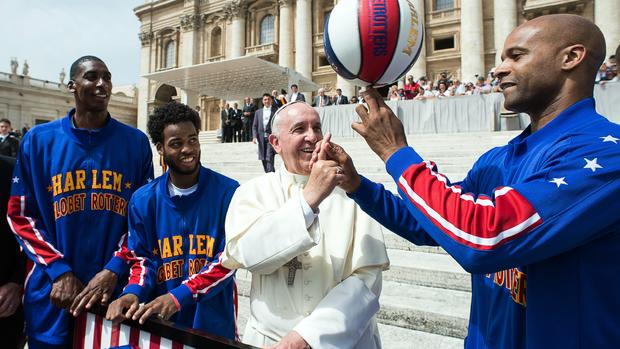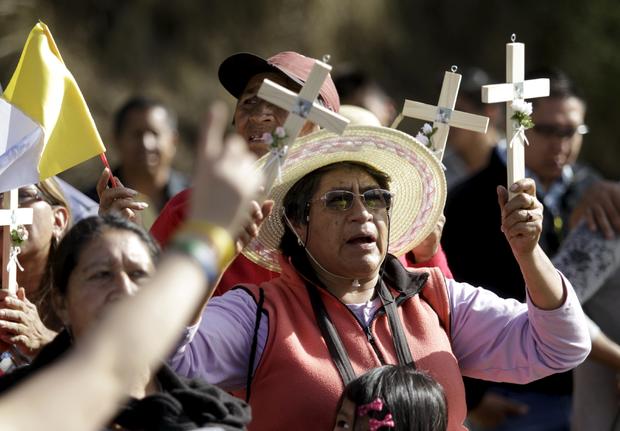Pope puts Latin America's poor at center-stage
QUITO, Ecuador -- Jubilant crowds greeted Pope Francis as he arrived Sunday in Ecuador, kicking off a nine-day trip that will also take him to Bolivia and Paraguay.
The Vatican says the theme of this journey to Latin America -- the pope's second since his election -- is reconciliation and renewal, but the return to his native continent will undoubtedly also hold special meaning for Francis, the first Latin American pope in history.
After a welcome ceremony at the airport, Pope Francis was driven in a small Fiat into the capital city of Quito. There, he switched to an open-top "Popemobile" and rode through streets lined by cheering crowds.
In the first speech of his trip, Francis set the tone for a tour during which concern for the poor and downtrodden will take center-stage. He urged Ecuadorians to meet contemporary challenges while respecting differences, and to strive for a just economic development that benefits everyone, "with particular concern for the most fragile of our brothers and sisters, and the most vulnerable minorities."
Pope Francis, who has said he wants "a poor church, for the poor," is in fact visiting three of South America's most destitute countries, whose histories call to mind colonization, authoritarianism and violence.
Once again, by choosing these three countries, the pontiff is reaching out to the peripheries of a continent; a quarter of the Bolivian population lives on about $2 per day. In Paraguay, 30 percent live on less than $8 per day. The pope very deliberately chose to visit the continent's poorer countries with small populations, rather than richer and more influential ones.
He's done the same in Europe, visiting Albania and Bosnia. The Vatican says Francis wants to encourage renewal for these countries' social and political life, and encourage peace and the development of democratic institutions.
Significantly, this will be the first trip on which Pope Francis speaks entirely in Spanish, his mother tongue. The pope is prone to ad-libbing, and on this trip, he's scheduled to give 22 speeches, making it very likely he'll veer off his prepared remarks and speak from the heart, something he does when he wants to underscore a matter of particular importance to him.
It will undoubtedly be a tiring trip for the 78-year-old pontiff. He'll cover five cities in seven days, and conditions will be challenging.
Temperatures will range from close to freezing to tropical, and there will also be a great range in altitude, from sea level to more than 12,000 feet in La Paz, Bolivia. The Vatican says that to minimize the possible health effects of high altitude, Francis' visit to La Paz will be capped at just four hours.
On a side note, last week it was reported that a Bolivian minister said Pope Francis would like to chew coca leaves when he lands in La Paz. Coca leaves, the main ingredient in cocaine, are used as a local remedy for altitude sickness, and it is completely legal. Vatican spokesman Father Federico Lombardi said the pope might very well try this local remedy, since he's happy to partake in popular traditions.
Despite the physical challenges, the Vatican says Pope Francis is not at all concerned about his health, and is convinced he'll be able to accomplish all the things on his agenda.
In each country, the pope is to meet with the presidents as well as economic, religious, and cultural leaders. But the highlights will come when he reaches out, as he normally does, to those on the margins of society.
He'll visit an old-age home for the poor in Ecuador. In Bolivia, he'll listen to the stories of detainees in a notorious prison, and reach out to indigenous people. In Paraguay, he'll tour a pediatric hospital and pray with the residents of one of the capital's biggest slums. The Vatican says the pope comes to offer comfort to those most in need, but Francis is also likely to utter his most forceful words on social justice precisely in these settings.
Francis is also expected to offer strong words on the environment, another topic close to his heart.
Ecuador has one of the highest levels of biodiversity in the world, and that plant and animal life is endangered by plans to expand drilling for oil, the nation's most important source of income.
The pope, who recently authored a landmark document urging bold action on climate change, is likely to encourage the three countries' leaders to balance their push for desperately needed economic growth with the need to protect the Earth, which he refers to as "our common home."
As is customary on his state visits, Pope Francis will hold large masses in each country, drawing between 1 and 2 million people for each. Out of respect for the huge ethnic populations, local traditions and languages will be incorporated.
When appropriate, the pope will move around in an open, un-armored Popemobile, per his preference, and the Vatican says there are no security concerns.
A homecoming, of sorts, will take place when the pope formally meets members of his own Jesuit order, which played a great role in the evangelization of Latin America beginning in the 16th century. Indeed, before becoming Pope Francis, Jose Maria Bergoglio was head of the Jesuit order in Argentina.
Filed by CBS Radio News correspondent Anna Matranga, traveling with Pope Francis.

